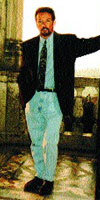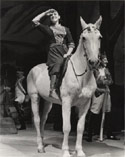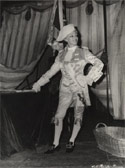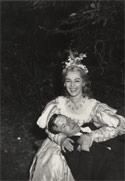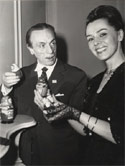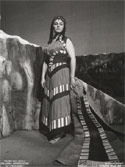|
Interview with Jolanda Meneguzzer |
|||
|
About the author, Mr. Patrick C. Byrne
Mr. Byrne studied voice with Professor Thompson at U.C.K.C, as well as Madame Lenora Lamar-Moss, and Linda Rossi, a protégée of Richard Tucker. His interest in opera has led to the development of a record label, OMBRA. He is a graduate of Rockhurst in Kansas city. Recently, Mr. Byrne has completed a co-authorship of a book on Maria Callas, with celebrity author Taylor Pero.
|
Jolanda Meneguzzer’s roles included Lucia, Rosina, Adina, Gilda, Zerlina, Maria ("Figlia del Reggimento"), Mimi, Musetta, Oscar ("Ballo"), Norina, Nanetta & Alice in "Falstaff", Parisina in "Parisina D’Este", Liu, Lauretta. Among the more unusual roles were Euridice in the opera by Peri, Eugenia in Paisello’s "Molinara", Figlia in Shostakovich’s "Il Naso", Donna Safo in Vlad’s "La Fantarca", and Autonoe in Henze’s "I Bassaridi", among many others. From Madame Meneguzzer’s chronology I count over fifty different roles spanning the period from 1957 to 1976 in a truly international career. Listen to a mp3-sample of Ms. Meneguzzer's voice while reading this interview:
[PCB]: Dear Madame Meneguzzer, it is with great pleasure that I have the honor of conducting this interview with you for the Belgian Opera Guide. Let me say that I have been a fan of your art for some time. I never had the pleasure of seeing you in person, but a gift from a friend several years ago, a video of your Gilda in Canada, made me very aware of your unique talent. [PCB]: I suppose that role, Gilda, is as good a place to start as any, for it serves, at least for me, to truly illustrate your response to the composer’s intent. Your “Cara Nome” was no simple display of vocal acrobatics, but made me believe that this was truly a young girl, exulting in her first taste of love. There was none of the silly giddiness I have often heard in this role. You were truly a girl about to be made a woman through unfortunate circumstance. What does it take to arrive at this interpretation? [JM]: Verdi’s intent for Gilda is, in my opinion, a betrayal of a young life, that betrayal reflected in Gilda’s self-sacrifice. Today that might not seem possible, but values were very different in the period in which "Rigoletto" is set. For this reason it is always wrong to remove stories from the approximate time period in which they are set, as with Lucia, Gilda, Rosina, Pia, etc.
[PCB]: Exactly. This is one of my pet peeves, the attempt by some of the opera directors to force a period piece into a time slot that cannot possibly fit with the values and habits of that composer’s designated period for the opera. [JM]: A good example of this is Rosina in "Barbiere" by Rossini. Rosina is a victim of the conventions of the day. She is not a woman entirely dominated by other men, but under the laces and fans she is a rebellious woman. She looks to be free, so she struggles and wins. Rossini made up a large part of my repetoire, for he is so seductive to me.
[PCB]: I find your “Una voce poco fa” from "Barbiere" to be particularly telling. This is not the usual “perky” Rosina, but a schemer with a bit of an edge. There was another famous soprano who was actually booed at La Scala for a similar approach to Rosina.
[PCB]: Who was your most important voice teacher, and did you continue to coach throughout the career? [JM]: My vocal teacher was Mrs. Nerina Baldisseri who is a direct descendent of the Marchesi school of singing. I began to study with her at sixteen and continued to follow her foundation throughout my career. My interpretive coach was Mario Rossini, a personal friend of Francesco Siciliani, both wonderful maestri. Today I pass on the invaluable lessons these maestri taught me through my singing school. Other strong influences in my career were Frederico De Sanctis, Luigi Ricci, Alfanso Siliotti and Raffaele Mingardo, all great masters of their art.
[PCB]: How would you classify your voice? Have there ever been offers to sing roles you refused, considering your vocal “fach”? I fear that many singers today will attempt anything. [JM]: My voice is lirico-leggero, and in my career I always avoided roles that I felt lay outside the boundaries of what I was comfortable with. That way I could constantly grow within my own vocal category.
[PCB]: I was astounded when I first heard your recording of Donizetti’s "Pia di Tolomei". You have two broadcast recordings of this, right? Tell us a little about this opera and your role. [JM]: The role of Pia is perfect for my vocal structure: dramatic pages, strong personality, agility, a lot of feeling. I searched out her character in her native Siena, in Dante, in her legend. I invented the end of the opera (her death) based on what I felt about her character. The stage director contested my opinion, but in the end he resigned and I was allowed to develop my Pia as I felt her to be.
[PCB]: Singing at the Florence Festival must have been a singer’s dream. This was “Boheme”, I believe. Our readers would be most interested to hear how you progressed through this opera, over the years. [JM]: I had my debut at the Maggio Musicale Fiorentino, where I starred in nine other opera productions. I recorded "Boheme" twice, once as Musetta, and then as Mimi. I took my Musetta to the Metropolitan Opera as well as the San Francisco Opera where I did many other roles over a number of years. I see Musetta, not at all vulgar, but full of life and sometimes, but not always, just a little greedy.
[PCB]: One of my favorite recordings of yours is “Ah non credea mirarti” from Bellini’s "La Sonnambula". I find that you imbue this with a great deal more depth than I have heard from other Aminas. I really think that Bellini truly intended Amina to move our emotions and not just fascinate us with scintillating vocal fireworks. [JM]: About Bellini’s "Sonnambula", I have a beautiful letter, framed on my piano, from Maestro Vittorio Gui, who heard my Amina on the radio. In the letter he says many touching things about my performance and closes with a “Brava”. As to the scintillating vocal fireworks, they are tedious without a soul singing inside; Callas teaches!
[PCB]: What have been your favorite roles? Are there any you wish you had done? I can actually imagine you doing Norma, judging by your voice in later years. [JM]: My favorite role happens to be whatever I am singing at the moment, even Henzes music, “Bassaridi” which I had the pleasure to present at Teatro La Scala. I try to use the same simplicity that I apply to all my operas. Now I dream always of the stage, but it was necessary to choose: to continue with a career or to remain with my son. I preferred to remain with my son. I was young, I could have added other roles. I was preparing a Traviata, Butterfly, and Desdemona. Norma and Aida need more dramatic vocal register, but I love them so much.
[PCB]: If we may, could we return to that lovely Canadian television production you did of "Rigoletto". I loved the sets, and lavish costumes and the interesting staging. [JM]: It was a long and meticulous work for the director and conductor. The singing was done as it happened, to keep the naturalness in the delivery.
[PCB]: Yes, I was very taken with the naturalness of the action, unlike some of those ridiculous looking RAI television productions that were made at the same time as your "Rigoletto". It was a very real performance. [JM]: I remember that the stage director kept shooting me in profile. I didn’t like my nose then. He blurted out that it was the best feature on my face, so I suddenly lost my complex. We were singing the production in English and the tenor, Campora, insisted in doing the first verse of “La donna e mobile” in Italian, saying it couldn’t be translated, but doing the rest in English! The final scene, in Sparfucile’s house, inspired the director to try and achieve a sort of “Western” effect. We were very excited about it, but then we were told that the final death scene would be cut, that wonderful scene with the baritone, because the audience might find it too sad. I told them I was going to leave on the next plane out unless they left it in! So we filmed it, and when I finished I saw the cameramen and crew were in tears. Amazingly, it was broadcast everywhere.
[PCB]: What do you think of singers today, in particular, their command of belcanto, an art you obviously are mistress of? [JM]: In every era there are good singers with appreciable art, but today they tend to forget the “mezze-voci” and the finesse which I consider so important.
[PCB]: Thank you again, Madame Meneguzzer. [JM]: Thank you, for your consideration.
Note of Patrick C. Byrne: It was with the greatest pleasure that this interview was conducted. My sincere thanks.
More information: -----
Dit
interview werd geschreven door Patrick C. Byrne, een Amerikaans
operaliefhebber, en ons toegezonden op 25 augustus 2004. Callas Corner - Opera Singer Maria Callas, Callas CD's & Merchandise http://members.aol.com/OmbraRecds/
|
||
|
|
|||
